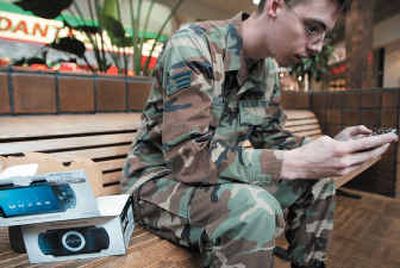PSP wireless option produces lots of fun

The problem with Sony’s new PlayStation Portable isn’t that it costs $250. It’s that you really should think about buying more than one.
The wireless head-to-head action that some games offer on the PSP is one of the best aspects of that nifty gadget: smooth, fast and a whole lot of fun.
My colleague Jim Schaefer and I played a couple matches of “Wipeout Pure” and “Twisted Metal: Head On” one-on-one (he’s still nursing his wounds). Setting up a multiplayer game was easy; the lobby screens look just like what you’re used to on a PlayStation 2. One player hosts the game, selecting the options and tracks and conditions of the match. The other opts to join a game and automatically receives a listing of the games hosted by people nearby.
Some games only allow local multiplayer, using the PSP’s short-range wireless abilities. That means only people in the same large room can play.
But if you have a wireless network at the office or at home – or you feel like grabbing a book or a cup of coffee in a business that offers wireless Internet access when you’re a patron – you can play people across the world using the Internet instead of a direct connection.
Sony calls that infrastructure play, to differentiate it from straight-on local wireless connections. But what it means is that with a little investment at home, you can play on your PSP against friends and family anywhere, just like you can on the big consoles.
The lag on those connections is worse than it is when the players are in the same room, but it wasn’t bad enough to interfere with gameplay.
Disc-fixer gets a spin
There’s nothing sadder than scratching your favorite game or CD and not being able to play for fun or for tunes. We had a couple sad-sack cases in the office last week, so I took the Digital Innovations SkipDr for a spin.
This scratch fixer is a really slick package. Everything you need fits into some hole on the device, so the spray solution, the polishing cloth, the drying tower and the platter for the CD all snap onto or slide into projections or holes on the motorized gadget.
To make it work, snap your damaged disc onto the platter, spray it with polishing solution, slide the platter into the device and turn it on, spraying more solution on the disc as it slowly makes two full revolutions through the polisher. Then dry it off and buff it out using a buffing pad.
We first tried it with a badly scratched “Halo 2” disc. While it polished down the deep scratches in the disc, it wasn’t enough to get the game working. We’ll try another pass with that one.
We had better luck with a music CD that was skipping. No skips after the polishing, and no damage in either case to the label, or data, side of the disc.
SkipDr, in the motorized version we tested, lists for about $50. Check it out at www.digitalinnovations.com.
NBA rejects exclusivity
Terrific news for sports gamers: Unlike the NFL, which now lives and breathes digitally only in the games of Electronic Arts, the NBA decided to go with a multi- publisher deal. It announced recently that it would provide non-exclusive licenses to EA, Take-Two Interactive, Sony Computer Entertainment America, Midway Games and Atari.
So football players, you have only one choice to see real players and real teams on screen. But basketball fans, your choices continue to be abundant.